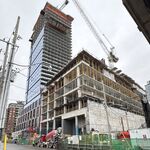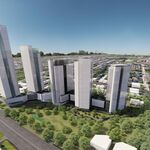A
alklay
Guest
I realize that miketoronto appears to be the only one voicing any concern in this area, and I sometimes feel he is unduling picked on with weak arguments, there is little doubt that the city has been missing out on economic activity and jobs (and that something has to be done for the health of the city):
Miller vows to increase city's economic focus
Apr. 20, 2006. 01:00 AM
JOHN SPEARS
CITY HALL BUREAU
Toronto needs to sharpen its efforts to bring jobs and investment to Toronto, Mayor David Miller acknowledged yesterday.
He promised to involve business leaders more in the city's campaign to grow its economy in the face of flaccid performance in recent years.
A report to city council last fall noted that Toronto has lost about 100,000 jobs in the past 15 years while 800,000 jobs have grown elsewhere in the Greater Toronto Area. A report last month to the economic development committee showed that the city's marketing efforts attracted just 10 firms (two of them were one-person operations) with a total of 280 jobs in 2005.
"Yes, we need to do more to attract and retain business," Miller said in response to reporters' questions after his "state of the city" address to the Toronto Board of Trade at an east-end Toronto hotel.
Miller pointed to the city's fledgling economic competitiveness advisory committee, endorsed by city council last fall.
It includes the mayor and three key councillors, plus 20 high-profile business leaders who will offer advice, pass on business leads and promote Toronto. The committee is still being formed. Glen Grunwald, chief executive of the board of trade, agreed that the city can do more. "I think we need to be a little bit more aggressive in attracting new business," Grunwald said in an interview. "We need to compete like other places are competing."
Toronto hired a permanent director of economic development only in February, after letting the post sit vacant for two years.
Councillor Jane Pitfield (Ward 26, Don Valley West), who is running against Miller for mayor in November's election, criticized Miller's speech as lacking direction.
"I heard instead more of an election platform," Pitfield said in an interview.
The city missed its chance to improve the business climate when, under Miller, it approved a plan to lower its high property taxes on businesses over a 15-year period instead of in a much shorter time frame, Pitfield said.
Miller spent much of his speech emphasizing how the city has obtained more money and enhanced its status with provincial and federal governments during his tenure as mayor. He made no mention of the board of trade's strong support for both initiatives dating back to the 1990s.
Miller insisted the city remains a "very good business destination."
The MaRS medical research centre is a magnet for bio-tech activity, he said, and the city has just developed a strategy for the information and communications technology sector.
Miller also said that the Toronto Stock Exchange "each year moves up the ranking in exchanges" although a spokesman for the TSE said the exchange's ranking of seventh in the world is little changed in recent years.
With files from Steven Theobald
Miller vows to increase city's economic focus
Apr. 20, 2006. 01:00 AM
JOHN SPEARS
CITY HALL BUREAU
Toronto needs to sharpen its efforts to bring jobs and investment to Toronto, Mayor David Miller acknowledged yesterday.
He promised to involve business leaders more in the city's campaign to grow its economy in the face of flaccid performance in recent years.
A report to city council last fall noted that Toronto has lost about 100,000 jobs in the past 15 years while 800,000 jobs have grown elsewhere in the Greater Toronto Area. A report last month to the economic development committee showed that the city's marketing efforts attracted just 10 firms (two of them were one-person operations) with a total of 280 jobs in 2005.
"Yes, we need to do more to attract and retain business," Miller said in response to reporters' questions after his "state of the city" address to the Toronto Board of Trade at an east-end Toronto hotel.
Miller pointed to the city's fledgling economic competitiveness advisory committee, endorsed by city council last fall.
It includes the mayor and three key councillors, plus 20 high-profile business leaders who will offer advice, pass on business leads and promote Toronto. The committee is still being formed. Glen Grunwald, chief executive of the board of trade, agreed that the city can do more. "I think we need to be a little bit more aggressive in attracting new business," Grunwald said in an interview. "We need to compete like other places are competing."
Toronto hired a permanent director of economic development only in February, after letting the post sit vacant for two years.
Councillor Jane Pitfield (Ward 26, Don Valley West), who is running against Miller for mayor in November's election, criticized Miller's speech as lacking direction.
"I heard instead more of an election platform," Pitfield said in an interview.
The city missed its chance to improve the business climate when, under Miller, it approved a plan to lower its high property taxes on businesses over a 15-year period instead of in a much shorter time frame, Pitfield said.
Miller spent much of his speech emphasizing how the city has obtained more money and enhanced its status with provincial and federal governments during his tenure as mayor. He made no mention of the board of trade's strong support for both initiatives dating back to the 1990s.
Miller insisted the city remains a "very good business destination."
The MaRS medical research centre is a magnet for bio-tech activity, he said, and the city has just developed a strategy for the information and communications technology sector.
Miller also said that the Toronto Stock Exchange "each year moves up the ranking in exchanges" although a spokesman for the TSE said the exchange's ranking of seventh in the world is little changed in recent years.
With files from Steven Theobald








